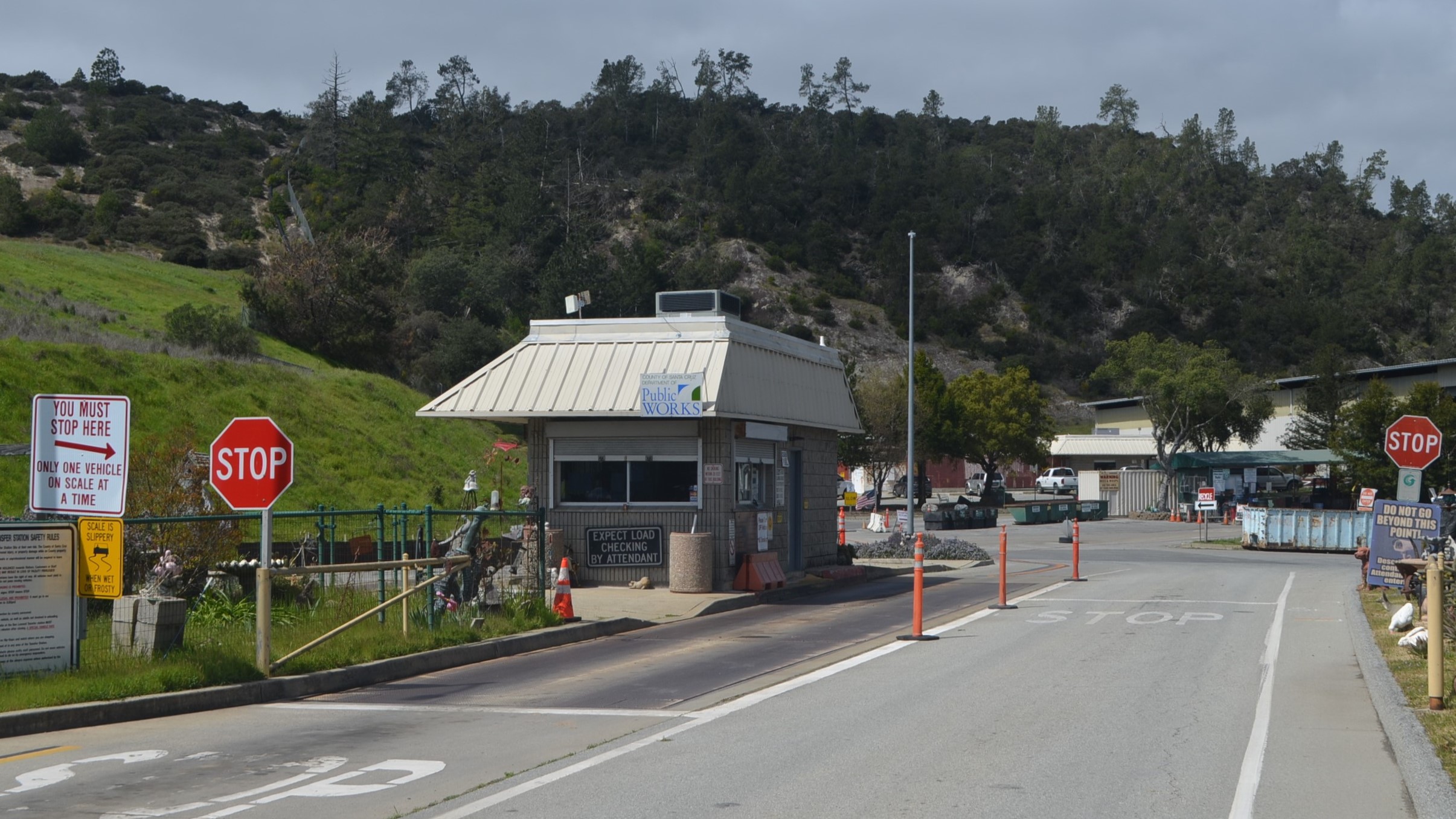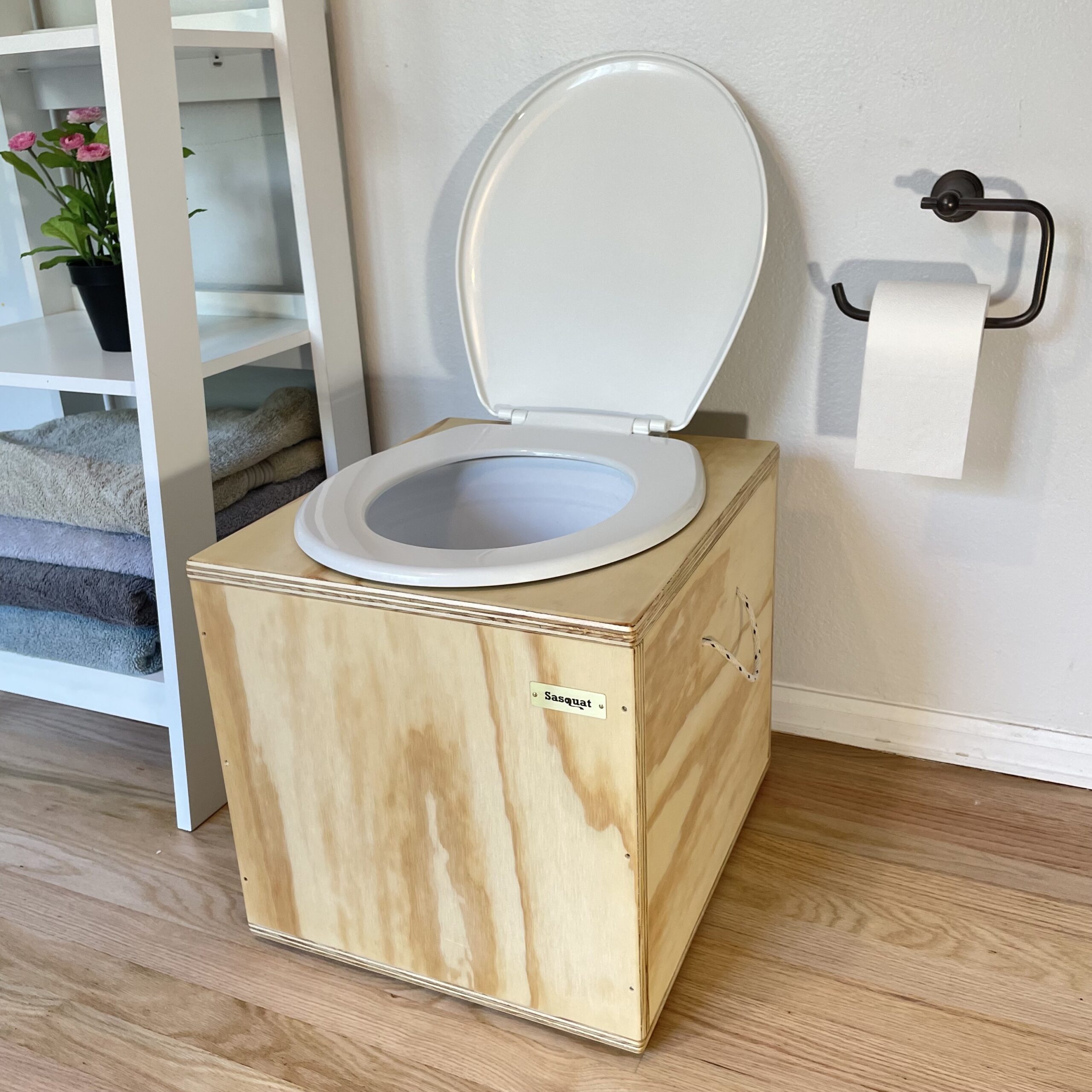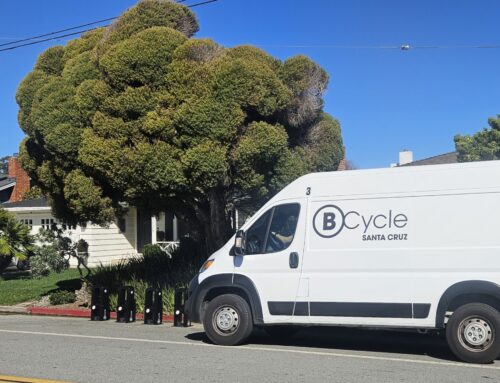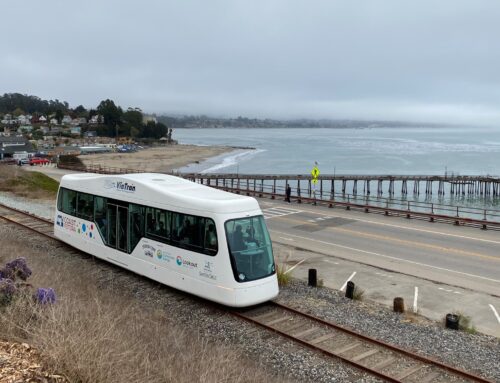
A compost toilet pilot program is expected to start in May in Ben Lomond, with waste bags collected at the Ben Lomond Transfer Station. (William S. Woodhams — Santa Cruz Local)
BEN LOMOND >> After months of delays, a composting-toilet pilot program is set to launch on 25 properties around Ben Lomond in May.
The participants are expected to be CZU Lightning Complex Fire survivors. Because expensive new septic systems have been required for many proposed rebuilds in the CZU Fire zone, the composting toilet program aims for a simpler, cheaper alternative. Participants are expected to be surveyed on their satisfaction with the toilets and asked about any practical challenges of installing and using them.
“Its success will confirm the safety and user-friendliness of composting toilets, ultimately helping the county determine if the container-based model would be adopted at scale,” wrote Santa Cruz County Supervisor Manu Koenig, in a text message.
Koenig and others first discussed the program in late 2020. Koenig brought the idea to the board of supervisors in 2022 and it was approved that year.
The pilot program has been delayed in part because of insurance problems where the waste would be processed. Composting facilities were proposed at Crest Ranch on Empire Grade and later moved to the Watsonville Wastewater Treatment Facility. If insurance is finalized in April, the pilot program is expected to start in May.
At least eight states including Washington and Texas allow composting toilets, but California is not one of them in part because human waste is not a legally defined category. State law regulates the handling of “bio-solids” like industrial waste, but not human waste, said Ryan Smith, wastewater division manager for the City of Watsonville.
“The goal is to get the law changed,” said Smith.
How composting toilets work
Santa Cruz County’s pilot program is being run by GiveLove, a West Hollywood nonprofit group that has installed compost toilets in Latin America, Africa and in the United States. The toilets are intended to improve health and the environment in areas that lack water and sanitation infrastructure.
In most areas of the Santa Cruz Mountains, flush toilets carry water and waste to septic tanks and leach fields on residents’ properties.
The compost toilets, or dry toilets, in Santa Cruz County’s pilot program use sawdust and bags that are transferred to waste sites for disposal. GiveLove’s toilets include a toilet seat, two containers, and bio-bags to line the containers. After each use, the user puts down a layer of sawdust for absorption.

Compost toilets in Santa Cruz County’s pilot program are expected to include a toilet seat, and a toilet box with a bag-lined container and sawdust. (GiveLove)
One bag is supposed to last three to five days depending on the size of the household, said Alisa Keesey, program director of GiveLove. GiveLove expects about eight bags per month per family. Each bag can weigh up to 10 pounds, Keesey said.
When the bag-lined container is full, the participants are expected to drop off bags at the Ben Lomond Transfer Station at 9835 Newell Creek Road in Ben Lomond. From there, GiveLove staff plan to transfer the bio-bags to the Watsonville wastewater plant where the human waste will sit for six months before it is expected to be used as fertilizer for trees at the plant.
“People are already using a compost toilet or a bucket with kitty litter and throwing it away in the trash,” said Smith, the Watsonville manager. “It is not ideal when there are other ways to transform it into a resource.”
Temperatures inside the bio-bags are expected to be checked daily to ensure the sterilization of harmful pathogens, said Smith. Samples are anticipated to be sent to a lab for tests. Because the waste goes to the Watsonville wastewater plant, it is exempt from the California Environmental Quality Act, according to a Santa Cruz County staff report.
The six-month pilot program is not meant to be permanent, but the families can keep them, Keesey said. GiveLove’s composting toilets are allowed only on properties with septic systems that were damaged in the CZU Fire.
Each toilet kit provided to the participants costs GiveLove $400.
Reasons for delays
Although the county supervisors approved the initial compost toilet pilot program in October 2022, a lack of insurance for the program at Ben Lomond Transfer Station has driven delays.
County supervisors in the first half of 2023 told county staff to return to them in August 2023 with an agreement for GiveLove to use the Ben Lomond station. County staff then told GiveLove that they had to find a $2 million insurance plan for the station, GiveLove leaders said. It was hard to find an insurer, Smith said.
GiveLove eventually found an insurer and they expect to have insurance solidified by mid-April, said Keesey. A “high net-worth individual” is paying for the $50,000 cost of the pilot program, Keesey said.
Keesey said she was frustrated by the delays, but she gave credit to Koenig for his work on the project.
“We need to, as a culture, to get away from our hang ups of flushing our poop away and forgetting about it,” said Keesey.
Keesey is a doctoral candidate in anthropology at UC Santa Cruz. She helped set up dry-toilet projects in Haiti after the 2010 earthquake and at the Standing Rock Indian Reservation that straddles North and South Dakota. The Santa Cruz County project has taken longer than both those projects, she said.
Future compost toilets in Santa Cruz County
For the county, the pilot is a way of testing the viability of alternatives to the water-based sewage systems that were damaged by the CZU Fire in 2020 and threatened during the Pajaro River flood in March 2023. Participants’ feedback will be an important part of the report, Smith said.
Smith described the compost toilet project as an unpaid passion project on top of his management of the Watsonville wastewater plant, he said. While studying national security threats to the nation’s wastewater systems at the Naval Postgraduate School in Monterey, Smith interviewed Keesey about dry sanitation. Now he is putting those ideas into practice. Smith said he would welcome 500 participants in a future project.
Keesey and Smith plan to report their findings to the board of supervisors at the end of the six-month trial. They said they hope that the results will inform the future of dry sanitation systems in the county and maybe in California.
Keesey said, “In the future, we might not have the luxury of using fresh water as a mechanism to carry poop somewhere.”
Correction: This story has been updated to reflect that Alisa Keesey is a doctoral candidate at UC Santa Cruz.
Questions or comments? Email [email protected]. Santa Cruz Local is supported by members, major donors, sponsors and grants for the general support of our newsroom. Our news judgments are made independently and not on the basis of donor support. Learn more about Santa Cruz Local and how we are funded.
William S. Woodhams is a freelance journalist from Santa Cruz. He holds a bachelor's degree in history from Wesleyan University.





